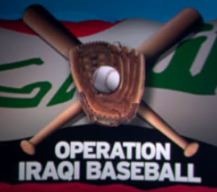 A delegation of 10 young Iraqi athletes and five coaches from three Iraqi cities are traveling in the United States May 3–13, on a Sports Visitors tour featuring baseball and softball programs. Organized by the U.S. Department of State’s SportsUnited initiative, the Bureau of Educational and Cultural Affairs will bring Iraqi and American youth together to do team building as well as learn baseball skills.
A delegation of 10 young Iraqi athletes and five coaches from three Iraqi cities are traveling in the United States May 3–13, on a Sports Visitors tour featuring baseball and softball programs. Organized by the U.S. Department of State’s SportsUnited initiative, the Bureau of Educational and Cultural Affairs will bring Iraqi and American youth together to do team building as well as learn baseball skills.
During their tour, the Iraqis will work with American players and coaches to hone their skills and will attend a clinic taught by Major League Baseball All-Star Ken Griffey Jr., a famous player and home run hitter. They will also go to baseball and softball skills training with American students at local secondary schools and colleges.
Attending a Major League Baseball game will be the high point — the Baltimore Orioles against the Seattle Mariners on May 11.
Baseball in Iraq is still a fledgling sport and very few Iraqis have any idea about it. But recent cheery news reports about cross-ocean ties are opening more people to the existance of baseball in the Tigris Valley.
It was only five years ago that a group of Iraqi expatriates returned home after living in the United States, bringing with them their acquired love of the game. Though lacking all of the equipment — baseballs, bats and baseball fields — a league of six teams came together and played games on soccer pitches because no baseball fields existed.
After they return from their State Department program, the Iraqi players and their coaches will have not only new skills and new equipment, they will be much better prepared to take amateur Iraqi baseball to its next level.
Last year, Iraq’s premier professional baseball team, the Tigris Tigers, experienced the generosity of Americans eager to share their love of the Nation’s Pastime.
With only one bat and three worn-out baseballs, the Tigers could barely hold a practice. Frustrated by his team’s predicament, Tigers’ coach Hamza Madlool talked about it with the American media.
Hearing of his dilemma, Americans stepped up to the plate, not only for his Tigers, but for the larger goal of one day making baseball popular in Iraq.
“Good American people who do not know us ran quickly to help us as soon as they heard about our miserable situation,” Madlool told McClatchy Newspapers in 2009.
Soon, the Tigers story leaped from the newspapers to American television. MSNBC news show host Rachel Maddow covered the Tigers’ situation and launched “Operation Iraqi Baseball,” asking Americans to help more Iraqis develop the means to learn and play baseball.
American individuals and businesses, moved by devotion to the “national pastime” — as baseball is called in the United States — responded.
Offers came in of financial assistance as well as uniforms and equipment. MSNBC worked with American donors and the assistant coach of the team to arrange for shipping everything to Iraq through Star USA Inc., an international trade company from Ohio.
Other groups pitched in as well. Operation Give, an American volunteer organization, in conjunction with shipping company FedEx, worked to collect donations of baseball equipment and deliver them to Iraq.
Within a few weeks of the MSNBC story, baseball clothing company Ebbets Field supplied uniforms appropriate to the hot weather of Iraq. CTG Athletics, a New York-based sporting goods company, donated bats, balls, baseball gloves and special baseball shoes.
Major League Baseball, the organization of America’s highest professional teams, donated rule books, instructional videos and equipment.
Baseball fans at the U.S. Embassy in Bagdad took notice.
Last fall, Ambassador Christopher Hill invited the Tigers to his residence for some baseball drills and lunch. The embassy has since stayed in touch with the players, and the friendships created have led to more dates. Members of the Tigers’ women’s softball team also participated. Ambassador Hill wore the replica jersey of a Japanese-born Major League Baseball star, making the point that baseball, although invented in America, is an international sport.
(Bureau of International Information Programs, U.S. Department of State: www.america.gov)



















